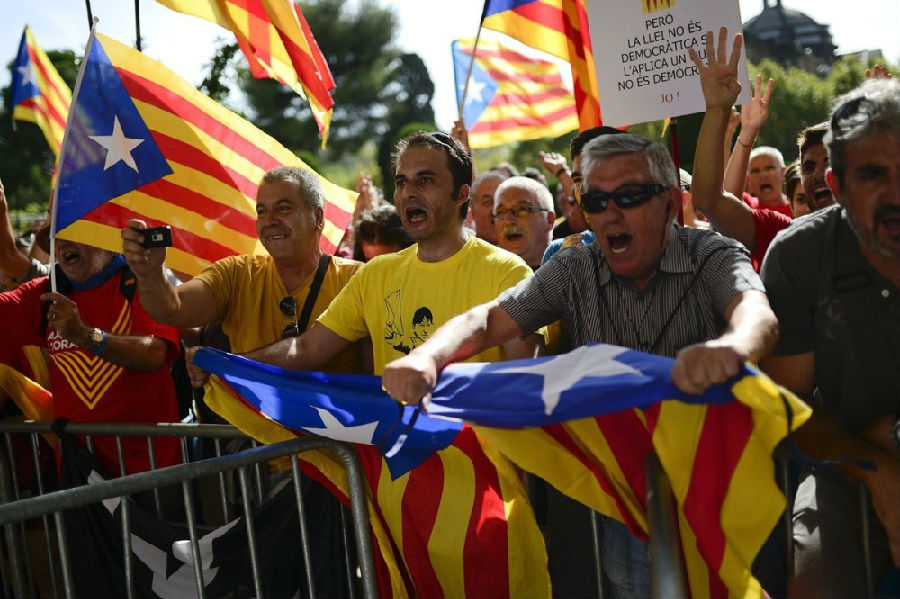Leaders Centrifugal Spain
先驅(qū) 沙盤上的西班牙
Umbrage in Catalonia
陰云籠罩卡泰羅尼亞
Even though the spectre of secession is an unwelcome distraction, Spain still needs to change
分裂的陰影分散了西班牙的注意力,盡管不受歡迎,但這個國家依舊需要變革
George Orwell, a British writer, fought in the trenches in the Spanish civil war to defend Catalonia from General Franco. He would surely be saddened by what is going on in that beautiful, cultured corner of Spain. On November 25th Catalans will vote in a regional election called as an unofficial referendum on independence. Since Catalonia represents a big chunk of the euro zone’s fourth-largest economy, and since Spain is in the front-line of efforts to save the euro, the vote and its aftermath will be felt farther afield.
英國作家喬治·奧威爾曾經(jīng)參加過西班牙內(nèi)戰(zhàn),保衛(wèi)過卡泰羅尼亞,抵御了佛朗哥將軍的部隊。如果他還在世,定會為在這個美麗文明的西班牙東北角上演的悲劇而痛心。11月25日卡泰羅尼亞人將進(jìn)行地區(qū)性選舉,也作非正式獨(dú)立公投。由于卡泰羅尼亞是歐元區(qū)第四大經(jīng)濟(jì)體西班牙的重要一部分,且西班牙又處在拯救歐元行動的前線,無疑這次投票及其結(jié)果都將產(chǎn)生及其深遠(yuǎn)的影響。

What could be wrong with 7.5m people with their own language and culture choosing to become a nation-state? At first blush, it is hard to object to what Catalan nationalists call the “right to decide”. In fact, there are many reasons why Catalans should not waste their energy trying to break away from Spain. Start by recalling Orwell’s definition of nationalism as “power-hunger tempered by self-deception”。
卡泰羅尼亞擁有750萬人口和屬于自己的語言,選擇獨(dú)立何錯之有?乍一看,似乎很難反駁卡泰羅尼亞民族主義者所謂的“自主決定權(quán)”。事實(shí)上,有很多理由解釋了為什么卡泰羅尼亞不應(yīng)該在爭取獨(dú)立這件事上耗費(fèi)精力。首先回顧一下奧威爾對于名族主義的定義:“一種因自欺而產(chǎn)生的權(quán)利饑渴”。
Under Spain’s constitution of 1978, Catalonia enjoys more self-government than almost any other corner of Europe. It runs its own schools, hospitals, police, prisons and cultural institutions. It lacks only tax-raising powers and the Ruritanian trappings of statehood, which nationalist politicians appear to be hungry for. As for the self-deception, this is sometimes farcical: Catalan public television offers a weather forecast that includes provinces that have been part of France since 1659, but no meteorological information for Zaragoza or Madrid. And most Catalans still seem happy to be both Catalans and Spaniards. Support for independence has risen mainly because Catalans think it would offer relief from recession.
依照西班牙1978年的憲法,卡泰羅尼亞享有比歐洲其他地區(qū)更多的自治權(quán),擁有自己的學(xué)校、醫(yī)院、警察、監(jiān)獄和文化機(jī)構(gòu),但唯獨(dú)沒有征稅的權(quán)利和理想王國的標(biāo)志,即被承認(rèn)的國家地位。而后兩者正是名族主義者所覬覦的。談到自欺,有時很可笑:卡泰羅尼亞公共電視的天氣預(yù)報會播放早在1695年就隸屬法國的一些行省的天氣預(yù)報,卻不播報薩拉戈薩或馬德里的氣象信息。而且卡泰羅尼亞人似乎很滿意自己既屬于卡泰羅尼亞又屬于西班牙。他們支持獨(dú)立主要是因?yàn)樗麄冇X得這樣能減輕經(jīng)濟(jì)衰退帶來的痛苦。
It would not. An independent Catalonia would have more fiscal revenues, but it would also have a higher debt burden than Spain. The argument that Catalans should not subsidise feckless Andalusians is a dangerous one: apply that more widely and the euro zone would fall apart. Indeed, far from welcoming Catalonia as an independent member, the euro zone’s leaders hardly yearn for an extra nation-state.
然而事實(shí)并非真如他們所想。如果獨(dú)立,泰羅尼亞人民將上繳更多的稅,而且承受的債務(wù)壓力要比沒有獨(dú)立時還大。有人認(rèn)為安達(dá)魯西亞人軟弱無用,卡泰羅尼亞不應(yīng)對其進(jìn)行補(bǔ)助,但這一論調(diào)很危險:若廣泛采納,每個國家都這么想,歐元區(qū)將分崩離析。誠然,歐元區(qū)領(lǐng)導(dǎo)人一點(diǎn)也不支持卡泰羅尼亞獨(dú)立,不希望多出一個國家來。
Spilling the Spanish beans
道破天機(jī)
All that said, the Catalan problem cannot be wished away. Roughly three-quarters of the next Catalan parliament is likely to vote for the right to decide. The constitution says only the Spanish parliament can approve a referendum—and it will not do so. The constitution has in general served both Spain and Catalonia well—but there is a case for updating it.
說歸說,但卡泰羅尼亞問題不是想結(jié)束就能結(jié)束的。下屆卡泰羅尼亞議會成員中大約四分之三將投票支持“自主決定權(quán)”。雖說憲法規(guī)定只有西班牙議會才能批準(zhǔn)公投,但憲法可以修改——憲法不會否決卡泰羅尼亞進(jìn)行公投的權(quán)利,總體來說憲法對于西班牙和卡泰羅尼亞同樣適用。
The Catalans’ complaints come down to two things. First they feel that Mariano Rajoy’s conservative government in Madrid refuses to recognise that Spain is a plurinational and pluri-linguistic country. Second, they think that, set beside the other 16 regions, they pay too much.
卡泰羅尼亞的不滿主要?dú)w結(jié)于兩件事上。第一,他們覺得馬里亞諾·拉霍伊政府不承認(rèn)西班牙是多民族國家,擁有多種語言。第二,他們認(rèn)為與其他16個地區(qū)相比,自己上繳的稅太多了。
The neatest answer to these grievances would be for Spain formally to embrace federalism, with a federal senate and clear rules about who collects which taxes. Federalism would mean each region was equal, with the same rights and obligations. But it has been a dirty word in Spain since a failed federal government in 1873-74. A messier, but more feasible, alternative would be to accept that some regions—Catalonia, the Basque country and perhaps Galicia—should have more autonomy than the rest and be recognised as cultural nations within Spain. Doing this would require a national pact to revise the constitution. After the Catalan vote, Mr Rajoy would be wise to set that process in motion.
針對這些不滿,西班牙最直接的解決方案就是正式建立聯(lián)邦制,設(shè)立參議院,并明確征稅體制。而聯(lián)邦的建立將意味著地區(qū)平等,享有同等權(quán)利,履行同等義務(wù)。事實(shí)上早在1873-74就已嘗試過建立聯(lián)邦,卻以失敗而告終,從那以后西班牙一直把聯(lián)邦制當(dāng)做污濁腐敗的代名詞。因此選擇一個相對較次但更可行的辦法將更容易為人接受——允許卡泰羅尼亞、巴斯克和加利西亞等一些地區(qū)享有更多自治權(quán),并承認(rèn)其各自的文化。若采取這一措施,西班牙需要制定一個憲法修改協(xié)定,而且拉霍伊最好在卡泰羅尼亞非正式公投后就行動起來。翻譯:郁炳睿












